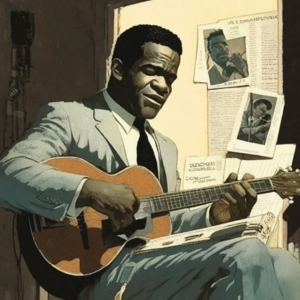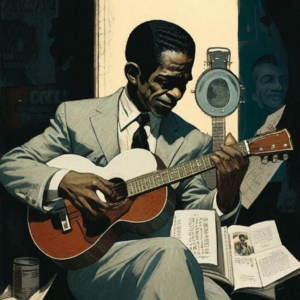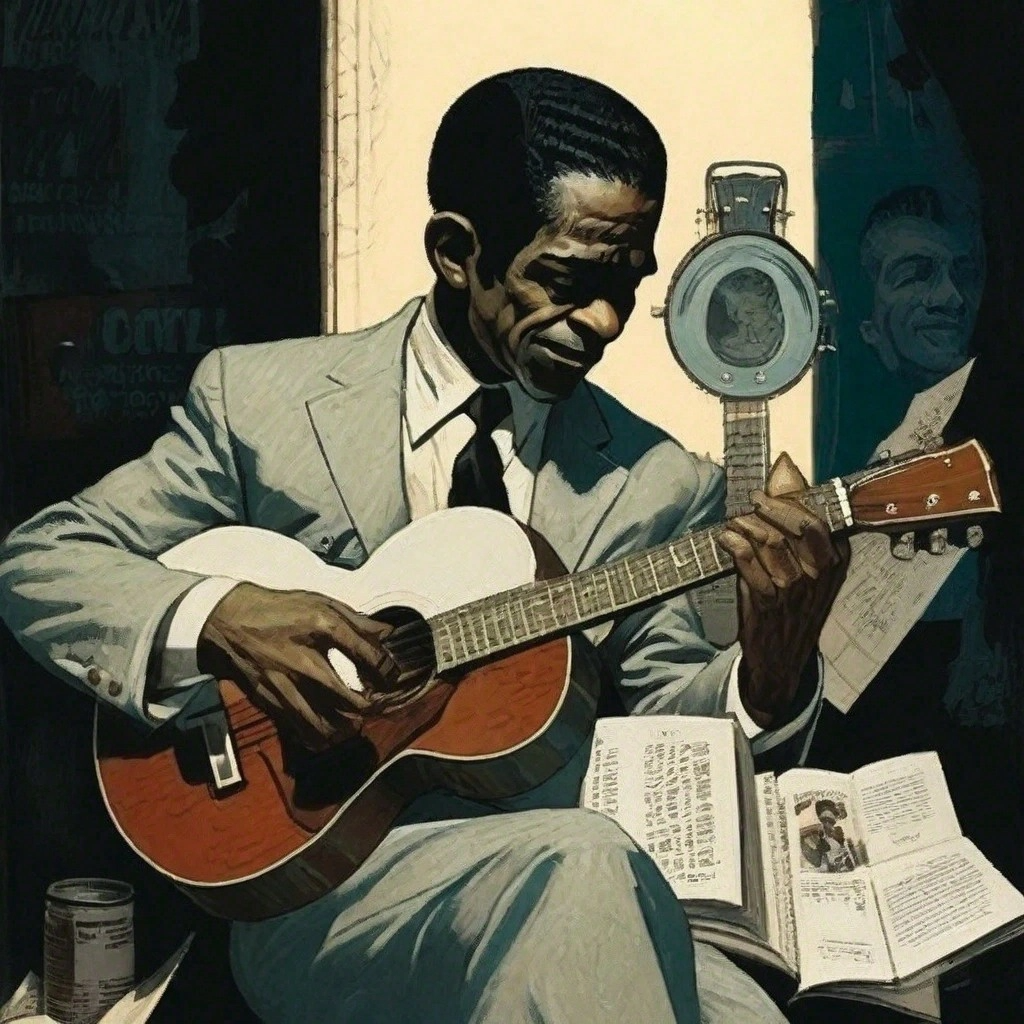Al Green: The Soulful Voice That Transcends Generations
In the rich tapestry of soul music, few voices resonate as profoundly and timelessly as that of Al Green. Born Albert Leornes Greene on April 13, 1946, in Forrest City, Arkansas, Green emerged as a preeminent figure in the genre during the 1970s, captivating audiences with his distinctive falsetto and emotive delivery. His contributions to soul music extend far beyond chart-topping hits; they represent a journey of self-discovery, spiritual awakening, and musical innovation.
From the tender age of nine, Al Green began his musical odyssey by performing gospel music alongside his family in churches across Arkansas. This early exposure to the raw power of gospel laid the foundation for Green’s future endeavors as a soul icon. As he honed his vocal skills and developed a deep reverence for music, Green’s passion for singing became undeniable.
 Green’s journey to stardom took a pivotal turn when he relocated to Michigan and joined the vocal group, The Creations. However, it was his encounter with record producer Willie Mitchell that would change the course of his career forever. Under Mitchell’s guidance, Green signed with Hi Records and embarked on a trajectory that would solidify his status as one of soul music’s most revered figures.
Green’s journey to stardom took a pivotal turn when he relocated to Michigan and joined the vocal group, The Creations. However, it was his encounter with record producer Willie Mitchell that would change the course of his career forever. Under Mitchell’s guidance, Green signed with Hi Records and embarked on a trajectory that would solidify his status as one of soul music’s most revered figures.
The 1970s marked a golden era for Al Green, as he unleashed a string of chart-topping hits that would define the decade. Songs like “Let’s Stay Together,” “Tired of Being Alone,” and “I’m Still in Love with You” captivated audiences with their soulful melodies and heartfelt lyrics. Green’s ability to infuse each performance with raw emotion and vulnerability endeared him to listeners around the world, establishing him as a paragon of soulful authenticity.
Beyond his musical achievements, Al Green’s influence transcends the realm of entertainment. His philanthropic endeavors and commitment to social justice have left an indelible mark on communities far and wide. Green’s unwavering dedication to spreading love and positivity through his music and actions embodies the essence of soul itself.
As we delve deeper into the life and legacy of Al Green, we uncover not only a prolific musician but also a beacon of hope and inspiration. His journey from humble beginnings to international acclaim serves as a testament to the transformative power of music and the resilience of the human spirit.
Join us as we embark on a journey through the life and music of Al Green, exploring the highs, lows, and everything in between that has made him a true icon of soul.
Early Years and Influences
Al Green’s formative years were steeped in the rich musical traditions of the Deep South, where gospel music served as both a spiritual expression and a communal bond. Born Albert Leornes Greene on April 13, 1946, in Forrest City, Arkansas, Green was raised in a household where music was not just a form of entertainment but a way of life.
From a young age, Green was immersed in the world of gospel music, thanks to his family’s deep-rooted connection to the church. He began singing in the choir at the tender age of nine, showcasing a natural talent and an innate understanding of melody and harmony. His early experiences in the church provided him with a solid foundation in vocal technique and instilled in him a profound appreciation for the power of music to uplift and inspire.
Green’s upbringing in the segregated South also exposed him to the harsh realities of racial discrimination and social inequality. These experiences would later inform his music, infusing it with themes of love, struggle, and redemption. Despite the challenges he faced, Green found solace in music, using it as a means of transcending the limitations imposed by society and expressing his deepest emotions.
As Green matured, his musical influences expanded beyond the confines of the church, encompassing a wide range of genres and styles. He drew inspiration from the soulful sounds of artists like Sam Cooke, Otis Redding, and Jackie Wilson, whose emotive performances left an indelible impression on him. Green was particularly drawn to the raw emotional honesty and authenticity of these artists, traits that would later become hallmarks of his own music.
In addition to soul music, Green was also influenced by the blues, jazz, and rhythm and blues that permeated the musical landscape of the 1950s and 1960s. He immersed himself in the works of legendary musicians such as B.B. King, Ray Charles, and Aretha Franklin, studying their techniques and absorbing the nuances of their performances.
Green’s eclectic musical palate laid the groundwork for his distinctive sound, which seamlessly blended elements of gospel, soul, and R&B. His ability to fuse these disparate influences into a cohesive and deeply personal musical style set him apart from his contemporaries and established him as a true innovator in the world of soul music.
As we reflect on Al Green’s early years and influences, we gain insight into the forces that shaped him into the iconic musician he is today. From his humble beginnings in the church choir to his encounters with the musical giants of his time, Green’s journey is a testament to the transformative power of music and its ability to transcend boundaries, both musical and societal.
Artistic Evolution and Musical Identity
Al Green’s artistic evolution is a testament to his willingness to explore new sounds, push creative boundaries, and evolve as a musician while staying true to his core identity. From his early gospel roots to his emergence as a soul icon, Green’s journey reflects a constant quest for musical innovation and self-expression.
Green’s transition from gospel music to secular soul marked a significant turning point in his career. While his upbringing in the church provided him with a strong foundation in gospel music, Green felt compelled to explore new avenues of expression and reach a broader audience. This decision to venture into secular music was met with both praise and criticism, but it ultimately allowed Green to fully realize his creative vision and expand his artistic horizons.
Throughout the 1970s, Green’s musical identity continued to evolve as he experimented with different sounds and styles. His collaboration with renowned producer Willie Mitchell proved to be instrumental in shaping his distinctive sound, characterized by lush arrangements, smooth melodies, and heartfelt lyrics. Together, they crafted a series of timeless albums that showcased Green’s versatility as a vocalist and his ability to convey a wide range of emotions with unparalleled sincerity.
One of the defining aspects of Green’s musical identity is his soulful falsetto, which remains one of the most recognizable voices in popular music. His ability to effortlessly transition between silky-smooth crooning and impassioned wailing imbues his performances with an unparalleled sense of depth and emotion. Whether delivering a tender love ballad or a fiery soul anthem, Green’s voice possesses a raw intensity and vulnerability that resonates with listeners on a profound level.
As Green’s career progressed, so too did his exploration of themes and subject matter in his music. While love and romance have always been central themes in his work, Green also delved into more introspective and socially conscious topics, addressing issues such as inequality, spirituality, and the human condition. His lyrics are often imbued with a sense of introspection and spiritual longing, reflecting his own personal journey of self-discovery and growth.
Despite experiencing a spiritual awakening in the late 1970s that led him to refocus on gospel music, Green’s soulful sensibilities continued to inform his artistic endeavors. His return to his gospel roots did not signify a departure from his soulful sound but rather a reaffirmation of his spiritual convictions and a deeper exploration of his faith through music.
As we reflect on Al Green’s artistic evolution and musical identity, we are reminded of the power of music to transcend boundaries and unite people from all walks of life. Green’s ability to navigate the complexities of love, faith, and the human experience through his music speaks to his enduring relevance and influence as a true icon of soul.
Career Milestones and Achievements
Al Green’s illustrious career is punctuated by a series of remarkable milestones and achievements that have solidified his status as one of the most influential figures in the history of soul music. From chart-topping hits to prestigious awards and accolades, Green’s journey is a testament to his unparalleled talent, dedication, and enduring impact on the world of music.
1. Breakthrough Success with Hi Records: Al Green’s partnership with Hi Records and producer Willie Mitchell proved to be a turning point in his career. His debut album with the label, “Green Is Blues” (1969), showcased his unique blend of soul, gospel, and R&B and laid the groundwork for his subsequent success.
2. Chart-Topping Hits: Throughout the 1970s, Al Green dominated the charts with a string of hit singles that solidified his reputation as a soul icon. Songs like “Let’s Stay Together,” “Tired of Being Alone,” and “I’m Still in Love with You” topped the Billboard R&B charts and crossed over to mainstream success, earning Green widespread acclaim and commercial success.
 3. Grammy Awards and Industry Recognition: Green’s contributions to soul music have been recognized with numerous awards and accolades, including multiple Grammy Awards. In 1982, he received the Grammy Award for Best Traditional Gospel Album for his album “The Lord Will Make a Way.” Additionally, he was inducted into the Rock and Roll Hall of Fame in 1995, cementing his place in music history.
3. Grammy Awards and Industry Recognition: Green’s contributions to soul music have been recognized with numerous awards and accolades, including multiple Grammy Awards. In 1982, he received the Grammy Award for Best Traditional Gospel Album for his album “The Lord Will Make a Way.” Additionally, he was inducted into the Rock and Roll Hall of Fame in 1995, cementing his place in music history.
4. Impact on Popular Culture: Al Green’s music has left an indelible mark on popular culture, influencing generations of musicians across various genres. His songs have been covered by artists ranging from Tina Turner to Justin Timberlake, and his soulful sound continues to resonate with audiences worldwide. Green’s music has also been featured in numerous films, television shows, and commercials, further solidifying his cultural significance.
5. Philanthropic Work and Community Engagement: Beyond his musical achievements, Al Green is also known for his philanthropic efforts and commitment to social causes. He has been involved in various charitable organizations and initiatives aimed at improving the lives of others, particularly in his hometown of Memphis, Tennessee. Green’s dedication to giving back to his community underscores his belief in the power of music to uplift and inspire positive change.
6. Enduring Legacy and Influence: More than five decades into his career, Al Green’s music continues to resonate with audiences of all ages. His soulful voice, heartfelt lyrics, and timeless melodies have earned him a devoted fan base and secured his place in the pantheon of musical legends. Green’s enduring legacy serves as a testament to his talent, creativity, and unwavering dedication to his craft.
As we reflect on Al Green’s career milestones and achievements, we are reminded of the profound impact he has had on the world of music and the enduring legacy he leaves behind as a true pioneer of soul. From his chart-topping hits to his philanthropic endeavors, Green’s contributions to music and society are nothing short of extraordinary.
Social and Cultural Impact
Al Green’s influence extends far beyond the realm of music, encompassing social and cultural spheres that have been profoundly shaped by his artistry, activism, and enduring legacy. From his soul-stirring melodies to his commitment to social justice, Green’s impact on society transcends boundaries and continues to resonate with audiences around the world.
1. Breaking Racial Barriers: As an African American artist during the tumultuous era of the civil rights movement, Al Green’s success broke down racial barriers and paved the way for future generations of black musicians. His ability to transcend racial divides through his music and connect with audiences of all backgrounds was a testament to the unifying power of soul music.
2. Promoting Love and Unity: At the heart of Al Green’s music is a message of love, compassion, and unity that has resonated with listeners for decades. His soulful ballads and heartfelt lyrics serve as a source of comfort and inspiration in times of hardship, reminding us of the importance of empathy and understanding in a divided world.
3. Championing Social Justice: Throughout his career, Al Green has been a vocal advocate for social justice and equality. From his involvement in civil rights causes to his support for marginalized communities, Green has used his platform to shine a light on pressing social issues and advocate for positive change. His music has served as a rallying cry for justice and a call to action for those fighting against oppression and injustice.
4. Empowering Marginalized Voices: As a black artist in a predominantly white industry, Al Green’s success helped empower marginalized voices and challenge prevailing stereotypes and prejudices. His authenticity, resilience, and unwavering commitment to his craft inspired countless aspiring musicians to pursue their dreams and break free from societal constraints.
5. Cultural Icon and Symbol of Hope: Al Green’s music has become a cultural touchstone, transcending generations and bridging cultural divides. His songs have been embraced by people of all ages and backgrounds, serving as a soundtrack for life’s most profound moments and a source of comfort during times of uncertainty. Green’s timeless appeal and universal themes continue to resonate with audiences worldwide, cementing his status as a symbol of hope, resilience, and enduring love.
6. Legacy of Inspiration: Beyond his musical contributions, Al Green’s legacy lives on through the countless artists he has inspired and influenced over the years. His soulful voice, emotive delivery, and unwavering commitment to authenticity have left an indelible mark on the world of music, shaping the sound of soul for generations to come.
As we reflect on Al Green’s social and cultural impact, we are reminded of the transformative power of music to inspire change, unite communities, and uplift the human spirit. Through his music and activism, Green has touched the lives of millions and left an indelible legacy that will continue to resonate for years to come.
Personal Life: Behind the Scenes
Behind the spotlight and the adoration of fans, Al Green’s personal life is a tapestry woven with triumphs, challenges, and moments of profound introspection. From his early upbringing in the segregated South to his spiritual awakening and beyond, Green’s journey is marked by both joyous highs and profound lows, all of which have shaped the man behind the music.
1. Early Influences and Upbringing: Al Green’s formative years in Forrest City, Arkansas, were shaped by the rich cultural heritage of the Deep South. Raised in a devoutly religious household, Green’s upbringing was steeped in the traditions of gospel music, which would later influence his musical style and lyrical themes. Despite facing the challenges of racial discrimination and economic hardship, Green’s family provided him with a strong foundation of love, faith, and resilience that would guide him throughout his life.
2. Struggles and Triumphs: Like many artists, Al Green’s journey to success was not without its share of struggles and setbacks. From early career challenges to personal hardships, Green faced adversity with courage and determination, drawing strength from his faith and the support of loved ones. Despite facing obstacles along the way, Green’s unwavering commitment to his craft and his belief in the transformative power of music propelled him forward, leading to numerous career milestones and achievements.
3. Spiritual Awakening and Transformation: In the late 1970s, Al Green experienced a profound spiritual awakening that would forever change the course of his life and career. Following a near-fatal accident in which he was scalded by hot grits, Green turned to religion for solace and guidance, eventually becoming ordained as a minister in the Full Gospel Tabernacle Church in Memphis, Tennessee. This spiritual transformation marked a pivotal moment in Green’s life, leading him to refocus his musical endeavors on gospel music and devote himself to spreading messages of faith, love, and redemption.
4. Personal Relationships and Family: Throughout his life, Al Green’s personal relationships have played a significant role in shaping his identity and informing his music. From his early marriages to his children and grandchildren, Green’s family has remained a constant source of love and support, providing him with a sense of grounding and purpose amid the pressures of fame and fortune. Despite the challenges of balancing his career with his personal life, Green has always prioritized his family and cherished the bonds that unite them.
5. Legacy and Reflections: As Al Green reflects on his life and career, he remains grateful for the opportunities and experiences that have shaped him into the man he is today. From his humble beginnings in the church choir to his status as a music icon and spiritual leader, Green’s journey is a testament to the power of faith, resilience, and the enduring pursuit of one’s passions. As he continues to inspire and uplift others through his music and ministry, Green’s legacy serves as a beacon of hope and inspiration for generations to come.
In exploring Al Green’s personal life behind the scenes, we gain a deeper understanding of the man behind the music – a soulful troubadour whose journey is as rich and complex as the melodies he sings. Through triumphs and trials, Green’s unwavering spirit and commitment to his values have left an indelible mark on the world, reminding us of the transformative power of love, faith, and the human spirit.
Discography and Creative Works
Al Green’s discography is a testament to his prolific creativity, spanning decades of soulful ballads, infectious grooves, and timeless melodies that have captivated audiences around the world. From his early recordings with Hi Records to his later gospel albums, Green’s musical output reflects a diverse range of influences and themes, showcasing his versatility as an artist and his unwavering commitment to his craft.
1. Early Albums with Hi Records: Al Green’s tenure with Hi Records in the 1970s yielded a string of classic albums that established him as a preeminent figure in soul music. His debut album, “Green Is Blues” (1969), introduced audiences to his smooth vocals and heartfelt songwriting, while subsequent releases like “Al Green Gets Next to You” (1971) and “Let’s Stay Together” (1972) solidified his status as a chart-topping sensation.
 2. Chart-Topping Hits: Throughout the 1970s, Al Green dominated the charts with a series of hit singles that showcased his distinctive sound and unparalleled vocal talent. Songs like “Let’s Stay Together,” “Tired of Being Alone,” and “Sha-La-La (Make Me Happy)” topped the Billboard R&B charts and crossed over to mainstream success, earning Green widespread acclaim and commercial success.
2. Chart-Topping Hits: Throughout the 1970s, Al Green dominated the charts with a series of hit singles that showcased his distinctive sound and unparalleled vocal talent. Songs like “Let’s Stay Together,” “Tired of Being Alone,” and “Sha-La-La (Make Me Happy)” topped the Billboard R&B charts and crossed over to mainstream success, earning Green widespread acclaim and commercial success.
3. Collaborations and Duets: In addition to his solo work, Al Green collaborated with a diverse array of artists throughout his career, lending his soulful voice to collaborations with everyone from Annie Lennox to Lyle Lovett. His duets with artists like Tina Turner (“Let’s Stay Together”) and Lyle Lovett (“Funny How Time Slips Away”) showcased his versatility as a vocalist and his ability to connect with other artists on a profound level.
4. Gospel Albums and Spiritual Journeys: In the late 1970s, Al Green experienced a spiritual awakening that led him to refocus his musical endeavors on gospel music. His gospel albums, including “The Lord Will Make a Way” (1980) and “Higher Plane” (1981), earned him critical acclaim and reaffirmed his status as a spiritual leader and musical innovator.
5. Legacy and Influence: Al Green’s discography continues to inspire and influence musicians across generations, with his soulful voice and timeless melodies serving as a touchstone for artists in a wide range of genres. His music has been sampled, covered, and celebrated by artists ranging from Justin Timberlake to Jay-Z, underscoring his enduring relevance and impact on popular culture.
As we reflect on Al Green’s discography and creative works, we are reminded of the depth and breadth of his musical legacy. From chart-topping hits to heartfelt gospel anthems, Green’s music transcends genre boundaries and speaks to the universal themes of love, faith, and the human experience. As his timeless melodies continue to resonate with audiences around the world, Al Green’s place in the pantheon of musical legends remains secure.
Fan Engagement and Community Building
Al Green’s connection with his fans extends far beyond the stage, encompassing a deep and enduring bond forged through shared experiences, mutual admiration, and a love for soulful music. Throughout his career, Green has demonstrated a genuine commitment to engaging with his fans and building a supportive community around his music, fostering a sense of belonging and camaraderie that transcends geographical and cultural boundaries.
1. Live Performances and Concerts: Central to Al Green’s fan engagement strategy is his electrifying live performances, where he creates unforgettable moments that leave a lasting impact on audiences. Whether performing in intimate venues or headlining sold-out arenas, Green’s dynamic stage presence and soulful delivery captivate fans and forge a powerful connection that transcends the barriers between performer and audience.
2. Interactive Social Media Presence: In recent years, Al Green has embraced social media as a platform for connecting with fans and sharing updates about his music and life. Through platforms like Instagram, Twitter, and Facebook, Green provides fans with behind-the-scenes glimpses into his world, shares personal anecdotes, and interacts directly with followers, fostering a sense of intimacy and accessibility that resonates with fans of all ages.
3. Fan Clubs and Online Communities: Al Green’s dedicated fan base has formed vibrant online communities and fan clubs dedicated to celebrating his music and legacy. These forums serve as virtual gathering places where fans can connect with like-minded individuals, share memories and memorabilia, and engage in lively discussions about all things Al Green. By providing a space for fans to connect and bond over their shared appreciation for his music, Green has cultivated a sense of belonging and camaraderie that extends beyond the confines of concert venues and record stores.
4. Meet-and-Greet Events and Fan Experiences: Al Green goes above and beyond to show his appreciation for his fans by hosting meet-and-greet events, fan Q&A sessions, and other special experiences that allow fans to interact with him on a personal level. Whether posing for photos, signing autographs, or simply sharing a few moments of conversation, Green’s warm and gracious demeanor endears him to fans and creates cherished memories that last a lifetime.
5. Charitable Initiatives and Community Outreach: In addition to engaging with fans through music, Al Green is also committed to giving back to the communities that have supported him throughout his career. Through charitable initiatives, fundraisers, and community outreach programs, Green uses his platform to make a positive impact and support causes close to his heart. Whether raising awareness for social justice issues, supporting local charities, or providing assistance to those in need, Green’s philanthropic efforts demonstrate his deep commitment to using his influence for good.
As we reflect on Al Green’s fan engagement and community building efforts, we are reminded of the profound impact he has had on the lives of fans around the world. Through his music, his actions, and his unwavering dedication to his fans, Green has created a legacy of love, connection, and shared humanity that transcends the boundaries of time and space.
Enduring Legacy and Historical Significance
Al Green’s legacy transcends the realm of music, leaving an indelible mark on popular culture, social consciousness, and the broader landscape of American history. From his groundbreaking contributions to soul music to his role as a cultural icon and activist, Green’s influence reverberates through the decades, shaping the course of music and society in profound ways.
1. Pioneering Contributions to Soul Music: Al Green’s innovative fusion of gospel, soul, and R&B revolutionized the music industry, paving the way for a new generation of soul artists and reshaping the sonic landscape of popular music. His smooth vocals, heartfelt lyrics, and infectious grooves set a new standard for soulful authenticity, inspiring countless artists to follow in his footsteps and helping to define the sound of an era.
2. Social and Cultural Impact: As a black artist during the civil rights movement, Al Green’s success broke down racial barriers and challenged prevailing stereotypes and prejudices. His music served as a source of inspiration and empowerment for marginalized communities, offering a voice to the voiceless and shining a spotlight on issues of social justice and equality. Green’s commitment to promoting love, unity, and understanding through his music and activism continues to resonate with audiences of all backgrounds, reinforcing his status as a cultural icon and advocate for positive change.
3. Musical Influence and Legacy: Al Green’s influence extends far beyond his chart-topping hits and acclaimed albums, permeating every corner of the musical landscape. His soulful voice, emotive delivery, and timeless melodies have inspired generations of artists across genres, from soul and R&B to pop, rock, and hip-hop. Green’s songs have been sampled, covered, and celebrated by artists ranging from Prince to Kanye West, underscoring his enduring relevance and impact on contemporary music.
4. Honors and Recognition: Throughout his career, Al Green has received numerous awards and accolades in recognition of his contributions to music and culture. He has been inducted into the Rock and Roll Hall of Fame, received multiple Grammy Awards, and been honored by organizations ranging from the NAACP to the Kennedy Center. These accolades serve as a testament to Green’s enduring legacy and historical significance as a true pioneer of soul.
5. Cultural Preservation and Archival: In recent years, efforts have been made to preserve and celebrate Al Green’s legacy through archival projects, museum exhibits, and documentary films. These initiatives aim to honor Green’s contributions to music and culture, educate future generations about his impact, and ensure that his legacy endures for years to come.
As we reflect on Al Green’s enduring legacy and historical significance, we are reminded of the transformative power of music to inspire change, unite communities, and transcend the boundaries of time and space. Green’s timeless melodies, soulful voice, and unwavering commitment to his values continue to resonate with audiences around the world, leaving an indelible imprint on the fabric of American music and society.
Conclusion and Reflections
Al Green’s journey from humble beginnings in the segregated South to international acclaim as a soul icon is a testament to the transformative power of music and the resilience of the human spirit. Throughout his career, Green has captivated audiences with his soulful voice, heartfelt lyrics, and unwavering commitment to authenticity, leaving an indelible mark on the world of music and beyond.
As we reflect on Al Green’s life and legacy, several key themes emerge:
1. Musical Innovation and Artistic Evolution: From his early gospel roots to his groundbreaking contributions to soul music, Al Green’s artistic evolution reflects a constant quest for innovation and self-expression. His ability to seamlessly blend elements of gospel, soul, and R&B created a sound that resonated with audiences around the world, inspiring generations of artists and redefining the boundaries of popular music.
2. Social Consciousness and Activism: Beyond his musical achievements, Al Green has used his platform to advocate for social justice, equality, and love. His commitment to promoting unity and understanding through his music and activism has left an indelible mark on society, challenging prevailing stereotypes and prejudices and inspiring positive change.
3. Spiritual Awakening and Personal Growth: Al Green’s spiritual journey, marked by a profound awakening in the late 1970s, serves as a testament to the transformative power of faith and the human capacity for redemption. His decision to refocus his musical endeavors on gospel music was a deeply personal one, reflecting his desire to express his faith and share messages of hope, love, and salvation with the world.
4. Enduring Legacy and Cultural Significance: As a cultural icon and pioneer of soul music, Al Green’s legacy transcends generations, genres, and geographical boundaries. His timeless melodies, soulful voice, and profound impact on music and culture continue to resonate with audiences around the world, ensuring that his legacy will endure for years to come.
In conclusion, Al Green’s life and music serve as a testament to the power of art to inspire, uplift, and unite people from all walks of life. His journey from humble beginnings to international acclaim is a testament to the transformative power of music and the enduring spirit of resilience, hope, and love. As we celebrate Al Green’s legacy, may we be inspired by his example to pursue our passions, embrace our authenticity, and strive to make a positive impact on the world around us.






